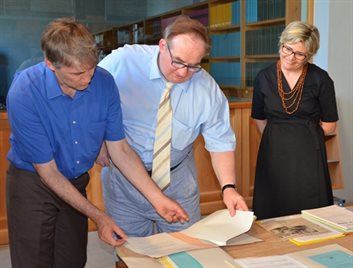Posted on 09 July 2015
 On Friday 26th June Jacek Saryusz-Wolski, Member of the European Parliament, Vice President of the European People's Party (EPP), Vice-Chairman of the EPP Group in the European Parliament responsible for foreign affairs, and former Polish Minister for European Integration, spoke at the roundtable “Has the EU succeeded in its primary mission of securing peace?”. Prof. Brigid Laffan (Director of the Robert Schuman Centre for Advanced Studies), Prof. Ulrich Krotz (Director of the Europe in World Programme, RSCAS & SPS Department) and Prof. Christopher Hill (Cambridge University) participated as discussant in the session, which had been organised by the European Studies Group at the EUI and the Historical Archives of the European Union. In his keynote speech, Vice-President Saryusz-Wolski assessed the results and impacts of the European Neighbourhood Policy to secure peace in Europe.
On Friday 26th June Jacek Saryusz-Wolski, Member of the European Parliament, Vice President of the European People's Party (EPP), Vice-Chairman of the EPP Group in the European Parliament responsible for foreign affairs, and former Polish Minister for European Integration, spoke at the roundtable “Has the EU succeeded in its primary mission of securing peace?”. Prof. Brigid Laffan (Director of the Robert Schuman Centre for Advanced Studies), Prof. Ulrich Krotz (Director of the Europe in World Programme, RSCAS & SPS Department) and Prof. Christopher Hill (Cambridge University) participated as discussant in the session, which had been organised by the European Studies Group at the EUI and the Historical Archives of the European Union. In his keynote speech, Vice-President Saryusz-Wolski assessed the results and impacts of the European Neighbourhood Policy to secure peace in Europe.
Saryusz-Wolski stated that the European Union needs to reassert its position as guarantor of security and peace for the continent. He did not hide his dissatisfaction with the recent lack of agreement on essential subjects for Europe, such as migration, defense and the Greek crisis. However, in his lecture Saryusz-Wolski argued for the retrieval of the founding principles of the European integration project, the promise of peace and prosperity, to address the current security problem in Europe: “We forgot about peace as a final target. We took it for granted and it ended in the hands of the Americans, while Europeans dislike them for that”.
The issue of a European army was soon raised in the discussion, proving crucial to all speakers. The economic integration process requires, according to Saryusz-Wolski, a “security umbrella”. The politician asseverated that Europe has the military capacity to do so at home, but not always where it is needed. In relation to this statement, Professor Christopher Hill expressed a rather striking thought, suggesting that Europe “might have to sacrifice peace in order to avoid aggression”, since the modern world “is not about pacifism”. Particularly the increasing tensions between Russia and Eastern European countries as well as Baltic members of the European Union drove most of the discussion afterwards.
When asked about Alexis Tsipras last visit to Russia in the middle of the talks taking place in Brussels, and Greece’s international lenders in deadlock, the politician admitted that this kind of flirtation may be perceived as lack of loyalty when "Greece is the most supported country of all those who had crisis problems".
After the roundtable, Saryusz-Wolski visited the Historical Archives of the European Union where he was presented a series of documents on the Polish integration process towards the European Union. The presentations included publications by Polish politician and founding member of the European Movement and the European League for Economic Cooperation LECE Joseph Retinger. Also reports from the European Parliament archives were shown on the aftermath of the martial law declaration in 1981 and the fall of the Berlin wall in 1989. Then, the first cooperation agreement between the Poland and the European University which had been signed by Saryusz-Wolski and the Polish accession to the EUI Convention of 2004 were presented and finally a recent deposit of the Polish politician and high official at the European Commission Georges Rencki was highlighted. In what was his first visit to the EU historical archives, Saryusz-Wolski praised the efforts to preserve the European memory at a destination where European citizens can find the inspiration for an integration project that is still very much “work in progress”.
Pictures from the visit of Mr. Saryusz-Wolski at the Historical Archives of the European Union in the Flickr album.